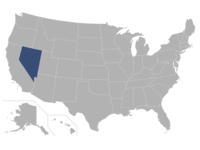Bill to beef up childrens’ behavioral health services watered down

Legislation designed to save the state money by providing front-end behavioral health care and reinvesting the savings in services for children is being watered down because of a lack of funding, according to Assemblywoman Sarah Peters, a Democrat from Northern Nevada and chair of the Assembly Committee on Health and Human Services.
“This is the goal where we want to be and someday intend to be,” Peters said of the bill’s original provisions during a committee hearing Monday. “However, the limited resources and capacity of the state in this area require that we look at more feasible options.”
A conceptual amendment introduced Monday scraps a provision that would have set up a new license structure by charging behavioral health providers a nominal fee that would have been used by the state to hire staff and set up behavioral health care plans. The fee would have triggered a constitutional requirement that two-thirds of lawmakers approve the bill.
Instead, the amendment proposes the creation of an interim committee to study the state’s options.
“Our state suffers from years of gaps in its continuum of care for behavioral health services,” Peters testified, noting the U.S. Department of Justice determined last year that Nevada “relies on segregated institutional settings like hospitals and residential treatment facilities among others, rather than offering children with behavioral health disabilities adequate community based services.”
Children are remaining in residential placements for nine months to a year, on average, the report said.
“Many stay even longer—27% of the children admitted to residential treatment facilities between August and October of 2019 stayed for over a year,” the DOJ wrote.
“It strikes me that when you get a report like that from the Department of Justice, it’s really nothing to be trifled with,” Assemblywoman Sabra Smith-Newby commented during Monday’s hearing. “I know we’re not the money committee, but it seems like there’s a lot of money right now.”
Gov. Joe Lombardo, who said in his state of the speech he intends to squirrel away surplus money for a rainy day, did not respond to requests for comment on the state’s response to the DOJ”s concerns.
Smith-Newby said she’s concerned the state is “open to sanctions or other actions through the DOJ or other federal agencies if we don’t fix this soon.”
The state responded to the DOJ report last year with a $43 million investment in community-based programs, but the one-shot funding from the American Rescue Plan left the provision of future services in question.
Then-Gov. Steve Sisolak said in a statement at the time that Nevada has failed to invest in “appropriate health resources for our children and our families….” and said he was committed to working with the DOJ to create “lasting systemic changes… Funds are already being built into my recommended budget…”
“It is significant that the Governor and many legislators expressed their support for continuing these programs in the future, even if future state funding was required,” former Assembly Speaker Barbara Buckley said at the time.
Now, the continuation of community-based programs, many provided by non-profit organizations, is in doubt.
“We don’t have buckets of money that we can talk about issues and come up with solutions,” Peters responded. “We end up having to do things incrementally.”








